





Dithylinum
Application instruction:
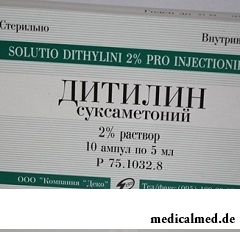 Dithylinum – the drug used for short-term muscle relaxation.
Dithylinum – the drug used for short-term muscle relaxation.
Form of release and structure
Dithylinum is released in the form of solution for intravenous and intramuscular administration (on 5 ml in ampoules, on 5 or 10 ampoules in a cardboard pack).
Active agent is a part of 1 ml of solution: succinylcholine iodide – 20 mg.
Indications to use
- Shutdown of spontaneous breath (bronkhoskopiya, intrakhealny intubation);
- Full muscle relaxation (reposition of dislocations, endoscopy, reposition of changes, abdominal, thoracic, gynecologic operative measures);
- Poisoning with strychnine;
- Tetanus (symptomatic treatment);
- Spasms at a countershock (prevention).
Contraindications
- Muscular dystrophy of Dyushenn;
- Hyperpotassemia;
- Malignant hyperthermia (including in the anamnesis);
- Bronchial asthma;
- Myatonia (inborn and dystrophic);
- Myasthenia;
- Acute liver failure;
- Closed-angle glaucoma;
- The getting injuries of eyes;
- Fluid lungs;
- Age till 1 year;
- Pregnancy and period of a lactation (breastfeeding);
- Hypersensitivity to drug components.
Dithylinum should be applied with care at the following diseases / states:
- Decrease of the activity of serumal pseudo-cholinesterase (anemia, a liver failure in an end-stage, widespread burns, a cachexia, persistent infections, long starvation, injuries);
- Chronic renal failure;
- State after plasma transfusion;
- Puerperal period;
- Plasma exchange;
- Tuberculosis;
- Tetanus;
- Artificial circulation;
- Malignant new growths;
- General diseases of connecting fabric;
- Myxedema;
- The emergency surgical interventions at patients with "a full stomach";
- Chronic and acute intoxication insecticides – cholinesterase inhibitors (at hit inside) or antikholinesterazny means (physostigmine, неостигмин, a distigmina bromide);
- Simultaneous use with the drugs competing with suktsinilkholiny for cholinesterase (Procainum intravenously).
Route of administration and dosage
The adult Ditilin enter intravenously slowly, kapelno or struyno (for long drop infusion 0,1% solution are used). Depending on a clinical situation, at intravenous administration the single dose can vary from 0,1 to 1,5-2 mg/kg of body weight.
When carrying out an intubation of a trachea enter 0,2-0,8 mg/kg; for prevention of complications during performing electropulse treatment (a separation of sinews and muscles, spasms) – 0,1-1 mg/kg intravenously (to 150 mg); for shutdown of spontaneous breath and muscle relaxation – 0,2-1 mg/kg; when performing endoscopy – 0,2 mg/kg; for a relaxation of skeletal muscles by comparison of fragments of bones after changes and reposition of dislocations – 0,1-0,2 mg/kg.
Throughout all operation Dithylinum it is possible to apply to long relaxation of muscles fractionally: on 0,5-1 mg/kg with a break of 5-7 minutes. As a rule, introduction of repeated doses promotes more long action.
To children Dithylinum is entered intravenously on 1-2 mg/kg or intramusculary in doses to 2,5 mg/kg (as much as possible – 150 mg).
Side effects
During use of drug development of allergic reactions (a bronchospasm, an acute anaphylaxis) and hyperpotassemias can be observed.
Also at introduction of Dithylinum there can be following side effects: lowering of arterial pressure, arrhythmia, disturbance of conductivity of heart, bradycardia (is more often at children, at repeated use – at adults and children), fever, cardiogenic shock, hypersalivation, increase in intraocular pressure, a mialgiya (in the postoperative period), long paralysis of respiratory muscles. In rare instances can be observed рабдомиолиз with development of a myoglobinuria and myoglobinemia.
Children, women and young patients (it is preferential at vagotonik) can have a short-term bradycardia, in some cases – an asystolia.
10-12 hours later after introduction of Dithylinum development of muscular pains is possible.
At repeated use of drug the apnoea and excessively long relaxation of muscles is sometimes observed long.
Special instructions
Dithylinum is applied only in the conditions of specialized departments with the equipment to artificial ventilation of the lungs when carrying out the general anesthesia.
Fibrillar muscular twitchings and the subsequent development of muscular pains can be avoided by means of preliminary introduction before infusion of Dithylinum (in 1 minute) chloride Diplacinum in a dose of 10-15 mg or Tubocurarini chloridum in a dose of 3-4 mg.
Slow introduction of Dithylinum, and also preliminary intravenous injection of 1-1,5 mg of atropine substantially prevent development of bradycardia and increase in bronchial secretion.
Patients with a renal failure (without symptoms of neuropathy and a hyperpotassemia) should enter Dithylinum once in average doses. Drug is not recommended to be used in the raised doses or for repeated introductions (because of risk of emergence of a hyperpotassemia).
Prolonged muscle relaxation with possible development of an apnoea can be observed because of several reasons: hereditary insufficiency of serumal cholinesterase or temporary decrease in its level, "atypical" cholinesterase of blood serum.
Medicinal interaction
At simultaneous use of Dithylinum with some medicines there can be undesirable effects:
- Verapamil, B Amphotericinum, antikholinesterazny means, procaineamide, Procainum, clindamycin, lidocaine, beta adrenoblockers, aminoglikozidny antibiotics, cyclopropane, quinidine, organophosphorous insecticides, Propanididum, salts of magnesium and lithium, chloroquine, quinine, pankurony, medicines with potential ability to reduce activity of cholinesterase of blood (дифенгидрамин, Aprotininum, are oestrogenic, промегазин, oxytocin, oral contraceptives, glucocorticosteroids in high doses): lengthening and strengthening of myorelaxation action of Dithylinum;
- Cardiac glycosides: strengthening of cardial effects;
- Anti-myasthenic drugs: decrease in their efficiency;
- Galogensoderzhashchy means for the general anesthesia: strengthening of undesirable impact on cardiovascular system;
- Atropine and thiopental of sodium: reduction of undesirable impact on cardiovascular system.
Drug is compatible to other muscle relaxants, narcotic analgetics, Ringer's solution, 6% dextran solution, isotonic solutions of sodium chloride and 5% fructose solution.
Dithylinum pharmaceutical is incompatible with alkaline solutions and solutions of barbiturates (because of formation of a deposit), and also with blood preparations and donor blood (because of hydrolysis).
Terms and storage conditions
To store in protected from light, the place, unavailable to children, at a temperature of 2-8 °C.
Period of validity – 1,5 years.
According to WHO researches the daily half-hour conversation by the mobile phone increases probability of development of a tumor of a brain by 40%.

Memory is an ability of the central nervous system to fix, keep and as necessary to reproduce information on knowledge...
Section: Articles about health
The cosmetics intended for improvement of a condition of skin, nails and hair are used by each woman. Expenses on regular acquisition of the fashionable widely advertized products of well-known companies for many become very notable and significantly to an obrema...
Section: Articles about health
Partial and the more so full loss of hearing significantly reduces quality of life. Difficulties with communication lead to loneliness and isolation. The person who badly hears experiences difficulties with social and professional implementation, quite often has problems in private life....
Section: Articles about health
Striya (extension) are the defects of skin having an appearance of direct or wavy strips from 1 to 10 cm long and 1-5 mm wide. In the majority with...
Section: Articles about health
Smack in a mouth can arise in the natural way – as a result of lack of morning hygiene or reception of the corresponding food. However in certain cases its existence is a sign of certain pathologies, and allows to reveal an illness at an early stage. In we depend...
Section: Articles about health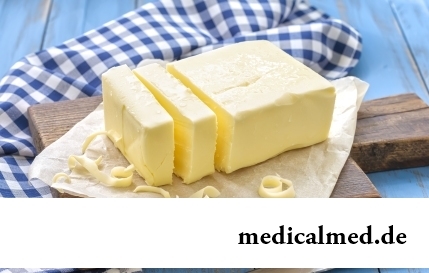
Within several decades of our compatriots convinced that the use of butter nasty affects a condition of coronary vessels. As a result the reputation of a product was impaired thoroughly a little, and many almost ceased to include it in the diet, having given preference "to safer" to vegetable fats. Meanwhile, the last researches showed that harm of butter for health is strongly exaggerated. But the product has a number of unique properties, to...
Section: Articles about health
Reactive pancreatitis - the disease which is characterized by inflammatory process in a pancreas which arises more often everything...
Section: Articles about health
Stability of a hormonal background is one of the most important conditions of preservation of health of the woman. At the same time endocrine system – the thin device extremely sensitive to any external influences. Changes of an image жиз can become the reason of hormonal failure...
Section: Articles about health
"Epilepsy" doctors made the diagnosis in antique times. Displays of an illness and pattern of its development are very well studied. However for nonspecialists this disease remains to not less mysterious, than in the ancient time. Many delusions are connected with epilepsy, and it sometimes very unpleasantly affects quality of life of patients and their relatives. In this article we will try to dispel the most known of similar myths....
Section: Articles about health
Cellulitis - very widespread cosmetic shortcoming which arises approximately at 80% of women sooner or later. Emergence ег...
Section: Articles about health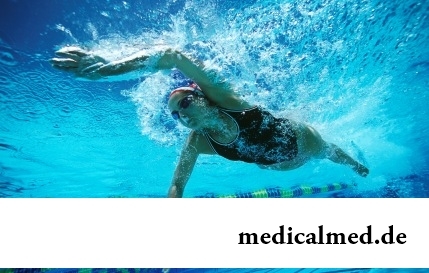
The state of health of the person depends on many factors. One of the most important is the constant, but not exhausting a physical activity. In the presence of various illnesses specialists often advise patients to do swimming which by right borrows ведущ...
Section: Articles about health
For the person who daily since morning gathers for work it is very important to wake up vigorous and ready by day of work. Actually, each of us experiences difficulties with this, at first sight, simple business from time to time. After night rest exert impact on a condition of an organism the weather which collected for several days fatigue, household and office problems, quality of a dream and many other factors....
Section: Articles about health
The naturopathy sometimes moves as the new direction of medicine, something like fashionable hobby, and there is nothing farther from the truth....
Section: Articles about health
From the failure of work of immune system which is shown in the form of an allergy, statistically, more than 40% of the population of the globe suffer. In most cases pathological reactions cause the substances which are contained in food stuffs, hair of animals, medicines...
Section: Articles about health
The way of life of people promptly changes from year to year: if about ten years ago the personal computer was not in each family, then today already very few people do without this device. Certainly, and children master the computer at full speed: they not only play on it games, but also study, and write school works, and search for necessary information....
Section: Articles about health
You are office worker, the driver, the fan of winter sports or do not think of life without bicycle? You conduct a slow-moving image жизн...
Section: Articles about health
Energy saving lamps are one of the most popular products of innovative technologies, and there is no wonder: they much more economic also are more long-lasting than usual filament lamps. At the same time there are fears that energy saving bulbs can become the reasons...
Section: Articles about health
There comes the season of issues. Many Russians already dream of outdoor recreation, trips, beautiful seaside beaches. At this time there is no wish to think of problems with health and other unpleasant things, however there are subjects which require attention. In the summer repeatedly the risk increases to ache with some very dangerous illnesses, we also will talk about them today....
Section: Articles about health
Life activity of one-celled fungi of the sort Candida is a proximate cause of development of candidiasis (milkwoman), it is related...
Section: Articles about health
Stroke (acute disorder of cerebral circulation) – one of the most widespread neurologic diseases. Annually in the world more than 6 million people die of this illness. From the survived patients about 80% become disabled people, and nearly a thirds from them впо...
Section: Articles about health
Any of us is not insured from a heavy illness of the loved one. Happens and so that someone from family members becomes the bed patient, and remains in such state for a long time. It extremely suppresses both the most injured, and all its house which life considerably changes....
Section: Articles about health
Practically each person is familiar with the annoying, pulling, unscrewing pains caused by overcooling of muscles of a back. In некото...
Section: Articles about health
Coffee - the tonic loved by many for the invigorating aroma and deep taste. Having the stimulating effect, coffee increases working capacity, promotes concentration of attention, fights against drowsiness and improves mood. Statistically, about 30% of inhabitants...
Section: Articles about health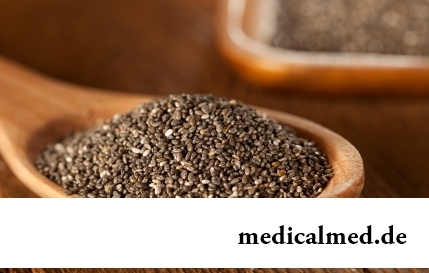
The chia plant, or the Spanish sage, is from South America. The indigenous people of the continent since ancient times used its seeds in food: small, but very nutritious kernels, in a form the reminding fasolina. Indians knew about useful properties of seeds of a chia, and applied them to maintenance of vitality and increase in endurance before serious exercise stresses....
Section: Articles about health
Wood louse – the ordinary-looking unpretentious plant extended in all territory of our country. It quickly expands, and sometimes for...
Section: Articles about health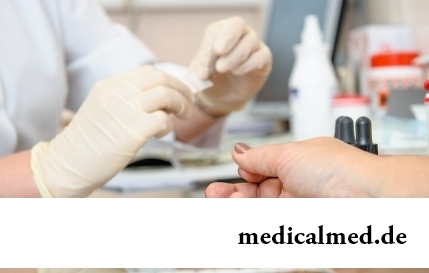
Each person knows that fervescence is an illness sign. However too low temperature (hypothermia), especially also can demonstrate existence of diseases when it is observed long enough. Such state is dangerous those...
Section: Articles about health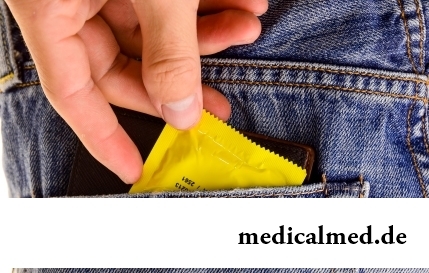
Today about 30 diseases, sexually transmitted are known. Wide circulation of these illnesses is extremely promoted by the dual attitude towards them: on the one hand, most of people know about "shameful" diseases very little and do not aim at receiving detailed and reliable information, considering that such problems personally will never concern them. With another – there are delusions about STD which instill unreasonable confidence that troubles such...
Section: Articles about health
